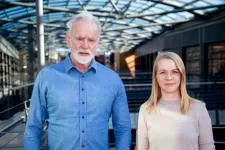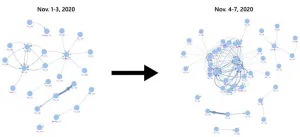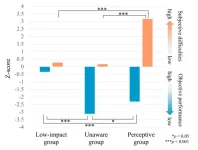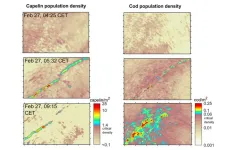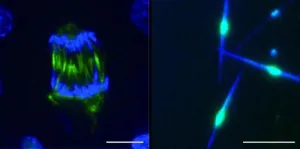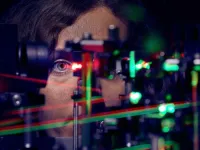(Press-News.org) Discovery of cancer risk associations for six novel genes
Scientists at deCODE genetics/Amgen, and their collaborators have discovered six novel genes with rare germline variants that associate with cancer risk. The findings are published today in Nature Genetics under the title “Gene-based burden tests of rare germline variants identify six cancer susceptibility genes”.
A subset of cancers arises in individuals who are born with rare sequence variants that significantly alter their cancer risk. The discovery of such variants, like those in the BRCA1- and BRCA2 genes, has led to improved early cancer detection and the development of targeted therapies, ultimately reducing the cancer burden and improving prognosis of those carrying these mutations.
In this study, the scientists analysed three large genetic datasets from individuals of European descent, including 130,991 cancer patients and 733,486 controls. Through a gene-based burden association analysis across 22 different cancer types, they found four novel genes associated with a risk of developing cancer; the pro-apoptotic BIK for prostate cancer, the autophagy involved ATG12 for colorectal cancer, TG for thyroid cancer, and CMTR2 for both lung cancer and cutaneous melanoma. The relative increase in cancer risk conferred by these variants was substantial (90-295%), but it should be noted that the design of the study does not allow accurate assessment of absolute lifetime cancer risk.
Additionally, the researchers found the first genes with rare variants that are associated with a decreased risk of cancer. Specifically, loss of AURKB was found to protect against any cancer type, and loss of PPP1R15A was associated with 53% lower risk of breast cancer. This suggests that inhibition of PPP1R15A may be a therapeutic option for breast cancer.
The study revealed new insight into the biological mechanisms involved in cancer predisposition that will hopefully lead to better screening and treatment strategies.
END
Discovery of cancer risk associations for six novel genes
Discovery of cancer risk associations for six novel genes
2024-10-29
ELSE PRESS RELEASES FROM THIS DATE:
More than half of European heat-related deaths in summer 2022 attributed to anthropogenic warming
2024-10-29
The unprecedented temperatures in the summer of 2022 caused more than 68,000 deaths on the continent, according to a study by the Barcelona Institute for Global Health (ISGlobal), a centre supported by the 'la Caixa' Foundation. A new study has now found that more than half - 56% - of the heat-related deaths in the summer of 2022 were related to human-induced climate change. According to the research, 38,154 of the 68,593 heat-related deaths in the summer of 2022 would not have occurred without anthropogenic warming.
The ...
Major events like presidential elections bring online hate communities together
2024-10-29
WASHINGTON (October 29, 2024) – A new study published today details the ways in which the 2020 U.S. election not only incited new hate content in online communities but also how it brought those communities closer together around online hate speech. The research has wider implications for better understanding how the online hate universe multiplies and hardens around local and national events such as elections, and how smaller, less regulated platforms like Telegram play a key role in that universe by creating and sustaining hate content.
The study – published in the journal npj Complexity, part of the Nature portfolio of journals – ...
Classification of schizophrenia into clinical subtypes based on objective and subjective social cognition
2024-10-29
A research team led by Professor Takahiro Nemoto at Toho University, in collaboration with Associate Professor Naoki Hashimoto and Assistant Professor Ryo Okubo at Hokkaido University, and Dr. Satoru Ikezawa at the National Center of Neurology and Psychiatry explored the agreement or discrepancy between subjective social cognitive difficulties and actual cognitive impairment. The study aimed to identify clinical subtypes in patients with schizophrenia, the results of which were published in Springer-Nature’s journal Schizophrenia on October 29, 2024.
Key Points
In patients with schizophrenia, a decline in social cognition—a fundamental skill for interpersonal ...
Can you feel sorry for a robot?
2024-10-29
A pitiful sound from tinny speakers, sad virtual eyes, trembling robot arms: it doesn’t take much to feel sorry for a robot. This is the conclusion of a study by Marieke Wieringa, who will be defending her PhD thesis at Radboud University on 5 November. But she warns that our human compassion could also be exploited: just wait until companies find a revenue model for emotional manipulation by robots.
Objectively, we know that a robot cannot experience pain. Still, under certain circumstances, ...
Oceanographers record the largest predation event ever observed in the ocean
2024-10-29
There is power in numbers, or so the saying goes. But in the ocean, scientists are finding that fish that group together don’t necessarily survive together. In some cases, the more fish there are, the larger a target they make for predators.
This is what MIT and Norwegian oceanographers observed recently when they explored a wide swath of ocean off the coast of Norway during the height of spawning season for capelin — a small Arctic fish about the size of an anchovy. Billions of capelin migrate each February from the edge of the Arctic ...
A molecular switch reshapes a dividing cell in minutes
2024-10-29
A living cell is a bustling metropolis, with countless molecules and proteins navigating crowded spaces in every direction. Cell division is a grand event which completely transforms the landscape. The cell starts behaving like the host of an international competition, reconfiguring entire streets, relocating buildings and rerouting its transportation systems.
For decades, researchers have been captivated by the cell's ability to organise such a dramatic transformation. Central to the process is the microtubule cytoskeleton, a network of fibres which provides structural support and facilitates movement within the cell, ensuring that chromosomes ...
Have we found all the major Maya cities? Not even close, new research suggests
2024-10-29
Using laser-guided imaging to peer through dense jungle forests, Tulane University researchers have uncovered vast unexplored Maya settlements in Mexico and a better understanding of the ancient civilization's extent and complexity.
The new research, published in the journal Antiquity, was led by Tulane University anthropology doctoral student Luke Auld-Thomas and his advisor, Professor Marcello A. Canuto.
The team used lidar, a laser-based detection system, to survey 50 square miles of land in Campeche, Mexico, an area largely overlooked by archaeologists. Their findings included evidence of more than 6,500 pre-Hispanic structures, including a previously unknown ...
Change in the law could help families of missing persons
2024-10-29
AN EXPERT on missing persons and unidentified human remains is hoping her research can help bring about a change in the law.
Work carried out by Emma Tilley, who is completing her PhD in Criminology and Policing at University of Staffordshire, is included in a Law Commission public consultation on burial and cremation.
Emma, who has starred in Locate International’s Channel 4 documentary series The Body Detectives, has been critically reviewing the cross-matching of unidentified human remains ...
Subtle eye movements optimize vision
2024-10-29
Our ability to see starts with the light-sensitive photoreceptor cells in our eyes. A specific region of the retina, termed fovea, is responsible for sharp vision. Here, the color-sensitive cone photoreceptors allow us to detect even the smallest details. The density of these cells varies from person to person. Additionally, when we fixate on an object, our eyes make subtle, continuous movements, which also differ between individuals. Researchers from the University Hospital Bonn (UKB) and the University of Bonn have now investigated how sharp vision is linked to these tiny eye movements and ...
Maternal health expert professor Vicki Clifton reveals placenta's hidden role in mental health
2024-10-29
Brisbane, Queensland, Australia (October 29, 2024) - In a revealing Genomic Press Interview published in Brain Medicine on October 29, 2024, Professor Vicki Clifton shares transformative discoveries about the placenta's unexpected influence on maternal mental health, potentially revolutionizing our understanding of pregnancy-related anxiety and depression.
Professor Clifton's team at the Mater Research Institute-University of Queensland has identified 13 distinct glucocorticoid receptor isoforms in the placenta, with one particular variant ...
LAST 30 PRESS RELEASES:
Buck Institute launches Healthspan Horizons to turn long-term health data into Actionable healthspan insights
University of Ottawa Heart Institute, the University of Ottawa and McGill University launch ARCHIMEDES to advance health research in Canada
The world’s largest brain research prize awarded for groundbreaking discoveries on how we sense touch and pain
Magnetofluids help to overcome challenges in left atrial appendage occlusion
Brain-clearing cells offer clues to slowing Alzheimer’s disease progression
mRNA therapy restores fertility in genetically infertile mice
Cloaked stem cells evade immune rejection in mice, pointing to a potential universal donor cell line
Growth in telemedicine has not improved mental health care access in rural areas, study finds
Pitt scientists engineer “living eye drop” to support corneal healing
Outcomes of older adults with advanced cancer who prefer quality of life vs prolonging survival
Lower music volume levels in fitness class and perceived exercise intensity
Of crocodiles, counting and conferences
AERA announces 2026 award winners in education research
Saving two lives with one fruit drop
Photonic chips advance real-time learning in spiking neural systems
Share of migratory wild animal species with declining populations despite UN treaty protections worsens from 44% to 49% in two years; 24% face extinction, up 2%
One in 20 babies experiences physical abuse, global review finds
Tundra tongue: The science behind a very cold mistake
Targeting a dangerous gut infection
Scientists successfully harvest chickpeas from “moon dirt”
Teen aggression a warning sign for faster aging later in life
Study confirms food fortification is highly cost-effective in fighting hidden hunger across 63 countries
Special issue elevates disease ecology in marine management
A kaleidoscope of cosmic collisions: the new catalogue of gravitational signals from LIGO, Virgo and KAGRA
New catalog more than doubles the number of gravitational-wave detections made by LIGO, Virgo, and KAGRA observatories
Antifibrotic drug shows promise for premature ovarian insufficiency
Altered copper metabolism is a crucial factor in inflammatory bone diseases
Real-time imaging of microplastics in the body improves understanding of health risks
Reconstructing the world’s ant diversity in 3D
UMD entomologist helps bring the world’s ant diversity to life in 3D imagery
[Press-News.org] Discovery of cancer risk associations for six novel genesDiscovery of cancer risk associations for six novel genes
